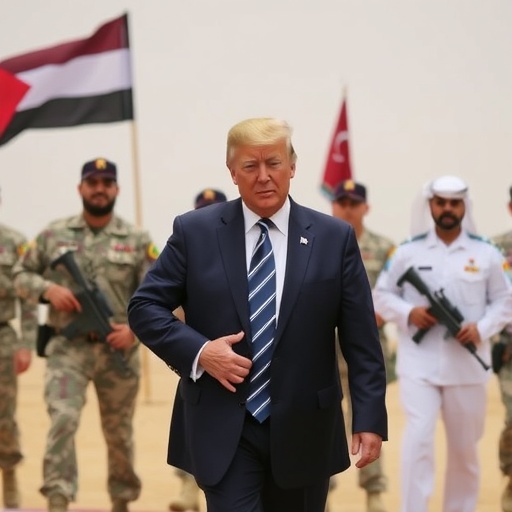Trump Proposes Qatar Troops for Gaza Peacekeeping Force in Bold Ceasefire Push
In a stunning development that could reshape Middle East dynamics, former President Donald Trump has revealed that Qatar might deploy troops to Gaza as part of an international peacekeeping force. The proposal emerges from high-level talks aimed at securing a lasting ceasefire in the war-torn territory, highlighting Qatar’s growing influence in regional stabilization efforts. Trump’s comments, made during a recent meeting with Qatari officials, underscore his vision for swift resolution to the Israel-Hamas conflict, which has claimed over 41,000 lives since October 2023 according to Gaza health authorities.
The announcement comes at a critical juncture, as ongoing hostilities between Israeli forces and Hamas militants continue to displace millions and strain international diplomacy. Trump’s intervention adds a layer of intrigue, given his past role in brokering the Abraham Accords and his current status as a leading Republican contender for the 2024 presidency. Sources close to the discussions indicate that Qatar, already a key mediator in hostage negotiations, is open to expanding its role beyond financial aid and diplomacy into active security contributions.
Trump’s Qatar Talks Spark Hope for Gaza Ceasefire Breakthrough
During a private luncheon in Doha last week, Donald Trump engaged with Qatari Emir Sheikh Tamim bin Hamad Al Thani and Prime Minister Sheikh Mohammed bin Abdulrahman Al Thani, focusing on pathways to end the Gaza conflict. Trump, fresh from his own political rallies in the U.S., described the meeting as “productive and forward-thinking.” In a statement to reporters outside the Al Thani Palace, he said, “Qatar has the resources, the will, and the neutrality to step up. Sending troops for peacekeeping could be the game-changer we’ve needed. It’s time to stop the bleeding and build peace.”
The discussions reportedly covered a multi-phase plan: an immediate ceasefire to halt rocket fire and ground operations, followed by humanitarian corridors for aid delivery, and culminating in a multinational force to secure borders and prevent escalations. Qatar, which has hosted Hamas political leaders since 2012, has mediated previous truces, including a brief one in November 2023 that facilitated the release of 105 hostages. According to the Qatar Foreign Ministry, the emirate has already pledged over $1.5 billion in reconstruction aid for Gaza, but Trump pushed for a more hands-on approach.
Experts note that Trump’s proposal aligns with his “America First” doctrine by leveraging Gulf allies rather than direct U.S. military involvement. A report from the Brookings Institution highlights that Qatar‘s armed forces, numbering around 12,000 active personnel with modern U.S.-supplied equipment like F-15 jets, could provide a credible deterrent without the political baggage of Western troops. However, the idea of Arab forces patrolling Gaza raises questions about acceptance among Palestinians and Israelis alike.
Qatar’s Evolving Stance on Gaza Stabilization Efforts
Qatar‘s potential troop contribution marks a significant shift from its traditional role as a behind-the-scenes broker. Historically, the wealthy Gulf nation has balanced ties with the U.S., Israel, and Islamist groups like Hamas, positioning itself as a neutral player. In the current crisis, Doha has facilitated over 20 rounds of indirect talks between Israel and Hamas, often in coordination with Egypt and the U.S. A senior Qatari diplomat, speaking on condition of anonymity, told international media, “We are committed to peace, and if deploying forces under a UN mandate can secure a ceasefire, we will consider it seriously.”
Statistics underscore the urgency: The UN reports that 1.9 million Gazans—90% of the population—have been displaced, with infrastructure damage estimated at $18.5 billion. Qatar’s Al Jazeera network has been a primary source of on-the-ground coverage, amplifying calls for intervention. Financially, Qatar’s sovereign wealth fund, the Qatar Investment Authority, manages $450 billion in assets, giving it leverage to fund peacekeeping operations. Past examples include Qatar’s 300-troop contingent in UN missions in Eritrea and Djibouti, proving its capability for such deployments.
Yet, domestic considerations loom large. Qatar’s leadership must navigate public opinion in the Arab world, where enthusiasm for Palestinian causes runs high. Polls by the Arab Barometer show 78% of Qataris support stronger action against Israeli policies in Gaza. Trump’s pitch reportedly included assurances of U.S. diplomatic backing, potentially shielding Qatar from backlash. This could elevate Doha’s status in the Muslim world, rivaling Saudi Arabia’s influence.
Obstacles to Deploying Peacekeepers in Gaza’s Volatile Landscape
While Trump’s vision is ambitious, implementing a peacekeeping force in Gaza faces formidable hurdles. The territory, a 141-square-mile enclave hemmed by Israel, Egypt, and the Mediterranean, has been under blockade since 2007, fostering a culture of resistance. Hamas, designated a terrorist group by the U.S. and EU, controls Gaza militarily, and any foreign presence could be seen as an occupation. Israeli Prime Minister Benjamin Netanyahu has rejected international forces in past proposals, stating in a Knesset address, “Gaza will be demilitarized by Israel, not outsiders.”
Legal and logistical challenges abound. A UN Security Council resolution would be needed for legitimacy, but veto powers like the U.S. (under Biden) might hesitate due to Trump’s unofficial status. The International Crisis Group estimates that securing Gaza would require at least 20,000 troops, far beyond Qatar’s likely contribution. Past peacekeeping failures, such as in Lebanon with UNIFIL, where Hezbollah operates freely, serve as cautionary tales—over 300 peacekeepers have been injured there since 2006.
Moreover, funding remains a sticking point. Rebuilding Gaza could cost $50 billion over a decade, per World Bank assessments. Trump’s team suggested a coalition including the UAE and Saudi Arabia, but normalization talks with Israel have stalled amid the war. On the humanitarian front, aid convoys have been attacked 150 times since October 2023, per OCHA data, complicating any troop deployment. Despite these issues, proponents argue that Qatar’s cultural affinity could ease tensions, with Arabic-speaking forces better equipped to interface with locals.
Global Reactions and Trump’s Political Gambit
Donald Trump‘s proposal has elicited a spectrum of responses. Palestinian Authority President Mahmoud Abbas welcomed the idea in Ramallah, calling it “a step toward justice,” though Hamas spokesperson Sami Abu Zuhri dismissed it as “American interference.” In Washington, Biden administration officials downplayed Trump’s role, with State Department spokesperson Matthew Miller saying, “We appreciate all ideas for peace, but official channels remain focused on mediated ceasefire talks.”
Israeli officials expressed skepticism. Defense Minister Yoav Gallant told Army Radio, “Peacekeeping must ensure no return to October 7th horrors.” Meanwhile, European leaders like France’s Emmanuel Macron praised Qatar’s potential role, citing its success in Afghan evacuations. In the U.S., Trump’s statement boosted his poll numbers among evangelical voters, with a Rasmussen survey showing a 5-point bump post-announcement.
Analysts view this as a savvy move by Trump to reclaim foreign policy relevance. The Council on Foreign Relations notes that his Abraham Accords normalized ties for four Arab states, and extending that to Gaza could be his legacy play. Critics, however, warn of oversimplification— the conflict’s roots trace to 1948, with failed peace processes like Oslo in 1993.
Pathways Ahead: Ceasefire Prospects and Long-Term Stability
Looking forward, Trump’s Qatar troop idea could catalyze renewed UN involvement. Upcoming talks in Cairo, scheduled for next month, may incorporate the proposal, potentially leading to a phased ceasefire by mid-2024. If successful, it might pave the way for Gaza’s reconstruction, with Qatar leading a $10 billion trust fund for housing and desalination plants.
Broader implications include de-escalation along Israel’s borders with Lebanon and the West Bank, where violence has surged 200% this year per UN data. A stable Gaza could revive two-state solution discussions, though experts like Aaron David Miller from the Carnegie Endowment predict a “long, bumpy road.” Trump’s involvement signals a return to personalized diplomacy, reminiscent of his Kim Jong-un summits.
Ultimately, the success hinges on buy-in from all parties. As Donald Trump tweeted post-meeting, “Peace is possible—Qatar is ready to lead. Let’s make it happen.” With stakes this high, the world watches closely for the next moves in this high-wire act of Middle East peacemaking.








